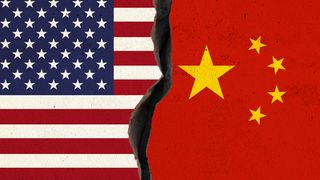The relationship between Washington and Beijing is increasingly characterised by competition in nearly every field - economic, military, technological, institutional and even ideological. That competition is unlikely to abate, and will in all likelihood intensify as modifying factors, such as economic interdependence, become less significant drivers of the relationship.
Moreover, recent polling in the United States shows hardening attitudes toward China on most issues. Nearly three-quarters of Americans (73 per cent) now say they have an unfavourable view of China, and more than 60 per cent believe the US should take steps to hold China accountable for its handling of the coronavirus and its unfair trade practices.
Nearly three-quarters of Americans (73 per cent) now say they have an unfavourable view of China, and more than 60 per cent believe the US should take steps to hold China accountable for its handling of the coronavirus and its unfair trade practices.
Recent actions by the US Congress also reflect this hardening, with legislation moving forward to sanction Chinese officials for the ongoing genocide in Xinjiang and crackdown in Hong Kong, strengthen America's military capabilities in Asia, and boost investment into research, development, and manufacturing of key technologies. But as much as popular attitudes and congressional legislation matter, presidential attitudes matter more in foreign policy. Both Trump and Biden will pursue a sharper approach to dealing with Beijing, but the nature of that competition will shift considerably based on who is elected president in November.
If you take the red pill ...
If Trump is re-elected, the contradictions of American policy on China would become more pronounced. Trump's antipathy towards coalition-building, his consistent affinity towards authoritarian governments and silence on their human-rights records, and his long-held opposition to free trade and multilateralism, will not moderate. Meanwhile, his administration will continue to have internal divisions between those seeking economic engagement on more advantageous terms, those bent on further disentangling the US and Chinese economies, and those looking to thwart Beijing's actions across the board.
A second Trump term would likely result in an uptick in symbolically aggressive actions, similar to the closure of the Chinese Consulate in Houston, a push for further bifurcation of the internet and increased regulation of the tech industry, more blacklists of Chinese companies and sanctions on Chinese officials. Trump would also likely restrict Chinese students and scholars studying or visiting the US. There would continue to be a push for reshoring manufacturing in the United States, and on the defence front, Trump would call for larger defence budgets, while cutting funding for diplomacy, foreign aid, and economic development. On the diplomatic front, a second Trump term might result in closer US-Australian ties, but that would likely prove the exception rather than the model for US alliances.
A second Trump term would likely result in an uptick in symbolically aggressive actions, similar to the closure of the Chinese Consulate in Houston, a push for further bifurcation of the internet and increased regulation of the tech industry, more blacklists of Chinese companies and sanctions on Chinese officials.
Looming over all of this would be the uncertainty of a temperamental Donald Trump. The Trump administration has presided over the largest shift in US policy towards China in four decades, but Trump himself is the greatest variable in this equation, on the one hand praising Xi Jinping, asking the Chinese leader for help with his re-election, treating Huawei and ZTE as potential concessions to the Chinese, and endorsing China's crackdowns in Hong Kong and Xinjiang, and on the other hand repeatedly blaming China and criticising China for a range of issues. As John Bolton, Trump's former National Security Advisor wrote: "The Trump presidency is not grounded in philosophy, grand strategy or policy. It is grounded in Trump. That is something to think about for those, especially China realists, who believe they know what he will do in a second term."
And, if you take the blue pill ...
Biden has made it clear that as China has become more domestically repressive and externally aggressive, his administration would not respond by turning back the clock to an earlier era of engagement, but rather by better positioning the country to respond to the comprehensive set of challenges posed by China. This would have both domestic and foreign policy components.
A Biden administration would almost certainly result in a major shift in tone and rhetoric, a recommitment to multilateral engagement, renewed focus on Southeast Asia, and a major push to rebuild ties with traditional allies.
A Biden administration would almost certainly result in a major shift in tone and rhetoric, a recommitment to multilateral engagement, renewed focus on Southeast Asia, and a major push to rebuild ties with traditional allies. While there would be a drive to identify limited areas of cooperation with China, some decoupling of the Chinese and American economies would continue. Human rights and democracy support would be high on the agenda, as would be increasing the budgets for diplomacy, aid, and development finance. A Biden administration would likely enact policies designed to secure technological advantage, strengthen economic resilience by building trusted supply chains, reinvigorate diplomacy, combat illiberal ideologies, enhance military deterrence and build greater asymmetric capabilities.
But for all the areas of broad consensus among Democrats, there are also areas of disagreement and ongoing debate - such as whether the US should maintain military dominance in Asia, whether values and democracy support should have a prominent place in US foreign policy, and whether a more accommodationist approach would work with Jinping's China. There is also discussion about whether the primary competition between China and the US is mainly in the military realm or in the economic and ideological space, and subsequently which set of policies and budgetary allocation of resources should receive priority. Finally, there is a broader debate about how to sequence competition and cooperation, and whether global health and climate change crises are so dire that competition needs to moderated, or bypassed in these areas.
It takes two to tango
The future of US policy towards China depends, to a large degree, on whether Biden or Trump captures the White House in November. But there are other factors at play and other actors involved that will set the broad contours of what is ultimately deemed feasible. These include congress's role, and the willingness of allies, such as Australia and Japan, to shoulder a greater role in their own and regional defence. But, perhaps most significant will be how much further China pushes, and the type of responses this engenders from US allies and partners.






